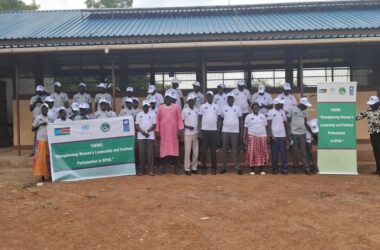By William Madouk
Ministry of Humanitarian Affairs and Disaster Management has launched an early warning system to mitigate the impact of natural disasters in the country.
The system is designed to provide timely alerts to communities and relevant authorities in the event of impending disasters such as floods, droughts, and other weather-related events.
By enabling early response and preparedness measures, the ministry aims to minimize the potential loss of life and property that may result from natural disasters.
“South Sudan has experienced a set of multiple climate extreme events; consecutive floods in 2019 up to 2022, drought, and desert locusts were the impacts that have taken a devastating toll on people,” said Minister Albino Akol Atak during the launch.
“I declare the South Sudan Early Warning for All Initiative is officially launched this day, November 20, 2023,” he said.
The Global Climate Risk Index 2021 ranked South Sudan as the eighth most affected country globally.
“Even this year, some floods are reported in unexpected areas due to climate change and variability. The country suffered because of abnormally severe floods, resulting in a horrifying humanitarian situation,” he explained.
“This situation evidences the fact that we need to invest in ROPA’s Integrated Multi-Hazard Early Warning System to help us reduce the adverse impact of the multiple hazards ranging from hydro-meteorological to the recent tremors of earthquake experience.”
According to him, effective early warning systems could lead to actual disaster risk decline and climate adaptation measures that inform communities prior to a disaster to prepare themselves, thus saving lives and livelihoods and providing a tenfold return on investment.
Mr. Pal Mai Deng, the minister of water resources and irrigation, speaking at the launch, said South Sudan’s vulnerability to climate shock is associated with a lack of knowledge and expertise in drought and flood risk management, environmental studies, and emergency management.
“The establishment of a new warning system in the country will help reduce the effect of climate shock by providing timely information for decision-making and action,” he said.
“This initiative is aimed at accelerating investment and action in support of the country’s national capability in climate risk reduction knowledge, observation, monitoring and forecasting, communication, and monitoring,” he noted.
The event was organized by the Ministry of Humanitarian Affairs and Disaster Management together with the International Federation of Red Cross and Red Crescent Societies (IFRC), the Netherlands Red Cross, and the South Sudan Red Cross, among others. With support from the Netherlands’ Ministry of Foreign Affairs.



